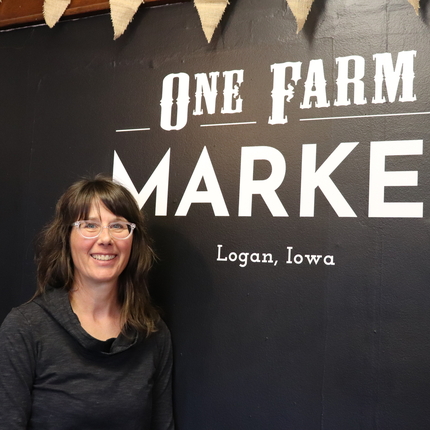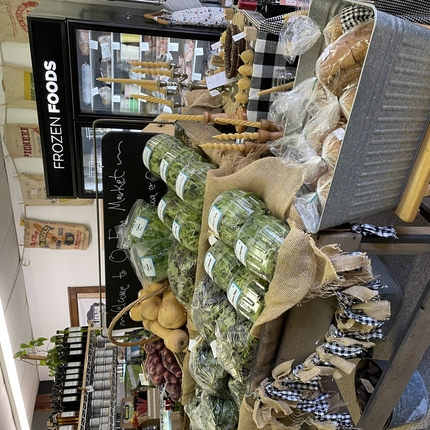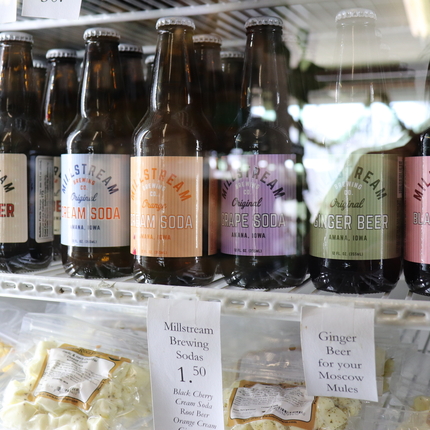Angelyn Wang contributed to this story. Click here to check out the case study.
To celebrate the 10th anniversary of her farm, One Farm, Danelle Myer wanted to do something special. Her curiosity about getting into the world of retail and knowledge from attending a small business workshop combined to help her form the idea of opening a seasonal pop-up market.
In October 2020, Danelle rented a vacant storefront in Logan, Iowa, with the intention of using it for a few months as a temporary farmers market booth. Not only could she sell things from her farm, she could also help revitalize an empty building in her community.
Through advertising and marketing on social media, the opening was a success. The community response was so overwhelming she decided to continue with a more permanent and expanded local foods store, and One Farm Market was born.
“The first day we had a table set up in the corner, we had our produce and a few shelf-stable things because I legally could not sell meat or eggs yet,” said Danelle. “I had my little cash box and prices in my head and we had a line out the door. People in small-town Iowa were sick of being inside and being told what to do. People were ready to get out, ready to support their local economy, caring about where their food came from. The stars aligned at the right time.”
Now, One Farm Market is a year-round local foods store offering One Farm produce along with vegetables, fruits, and herbs from other growers. It also offers beef, pork, lamb, chicken, bison, and more, as well as dairy, eggs, honey, seasonings, pasta, and granola.
Once a week, local bakers supply whole wheat loaves, focaccia, and scones for “fresh bread” Saturday. While customers are shopping for freshly baked goods, they can also pick up body care products, locally roasted coffee beans, shelf-stable products, and homegoods.
Aside from a few exceptions, everything in the store comes from local growers and producers from Iowa to the Omaha, Nebraska, metro area.
“Running this store has made me feel more connected to my community than I did standing at a farmers market booth for 10 years,” said Danelle. “I have gotten to know people, I feel like I’m educating people, and I feel like I’m inspiring people.”
Danelle also lets her storefront be a platform for others to have the opportunity to sell their goods and tell their stories.
“The production side of farming is not my strong suit,” she said. “We’ve grown a lot of food and had a lot of successes but it’s just more fun to be part of increasing the likelihood of someone buying local. People come in for different reasons—grabbing coffee beans, grabbing meat, grabbing soap, cross-pollinating the different things, items, and local food offerings. The store is visible public relations.”
For others who might be interested in increasing access to local foods in their own community, Danelle says it’s important to make your own path.
“Do it your way, don’t just emulate what other people are doing,” she said. “What is your gut telling you? What is your heart telling you? What puts you on fire? Do that thing. Know your audience as best you can and then listen to them.”
Not everything in her store is something she’s personally passionate about, she said, but she stocks it because she cares about what her audience wants.
“There are things in the store I have never tried, not because there is something wrong with them, it just isn’t my thing,” said Danelle. “The first six months I really enjoyed watching and listening to what customers were saying and then responding by finding a product that met that need. Bottom line: Listen to your gut, do what is true to you, but also listen to your customers. I see this store as a service and not just a bunch of products. This store offers a service to the community, so think about what service you want to invite your community into.”
Looking back, Danelle feels like she could have handled some things differently when she first opened her store, but she thinks it unfolded the way it needed to for her to get to where she is today.
“I never worked in retail or ran a point-of-sale system,” she said, “and (I) wished I would have known more about how retail works, like displays and merchandising, as well as costs and shipping, but I slowly figured it out as we kept morphing and growing. Within six months people told me I needed a bigger space, but I have enjoyed cramming a lot into a small space with really affordable overhead.”
Danelle has also been able to build relationships through her work in ways she never imagined she could.
“If you are passionate about something and you create something that is aligned with your passion, people will come if you are genuine about it,” she said. “I am actually meeting farmers, vendors, and makers in person and learning about them and learning about their products. It is really grassroots. Building these relationships is a day-by-day, week-by-week process. Baby steps. But if you put vibes out there, you’ll mesh well with someone.”
This case study series highlights an innovative local foods access initiative happening in southwest Iowa. It includes a variety of initiatives and projects that can serve as idea-starters to incorporate in other communities. The Center for Rural Affairs is able to assist in developing local food access plans across the region. Click here for more information.







